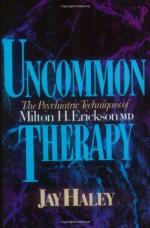
|
| Name: _________________________ | Period: ___________________ |
This quiz consists of 5 multiple choice and 5 short answer questions through Chapter 4, Part 2.
Multiple Choice Questions
1. Erickson's type of reinforcement in the example in Chapter 3 was incredibly effective and the _____ fell from the forefront into the background of the client's life.
(a) Arrhythmia.
(b) Appendicitis.
(c) Asthma.
(d) Headaches.
2. Under which heading of Chapter 1 is it stated that Erickson emphasized both the autonomy and togetherness of family members?
(a) "Emphasizing the Positive".
(b) "Avoiding Self-Exploration".
(c) "Awakening and Disengagement".
(d) "Encouraging Resistance".
3. Therapy is meant to facilitate the transition of a person from the situation of being a child into being what?
(a) An independent adult.
(b) A codependent adult.
(c) None of the answers is correct.
(d) A functioning adult.
4. There may be fears, insecurities and inadequacies involved, but Erickson is not so interested in these or in explaining all about the shortcomings to the client, but rather Erickson focuses on helping the client to work towards what?
(a) Success in other areas of life.
(b) Unveiling their past.
(c) Discussing their family.
(d) Releasing pent-up emotions.
5. Erickson writes of withholding and sharing information and of how he succeeds in curing a young woman of pain she experiences during ______.
(a) Intercourse.
(b) Childbirth.
(c) Menstruation.
(d) Marriage.
Short Answer Questions
1. When Erickson conducts long-term therapy, he does not do it as extensive and lengthy contact with meetings once each week for years. Instead, he does what?
2. Harold's experience with his first relationship was so good that he voluntarily reconsidered his own views and chose to do what?
3. Which heading in Chapter 1 is shown to help work out residual resistance to desirable changes?
4. Which title from Chapter 1 is also used for negative reinforcement and as a means to redirect patients?
5. When Harold has succeeded in school, Erickson persuades him to drop the idea that he is somehow _____ minded.
|
This section contains 322 words (approx. 2 pages at 300 words per page) |

|




